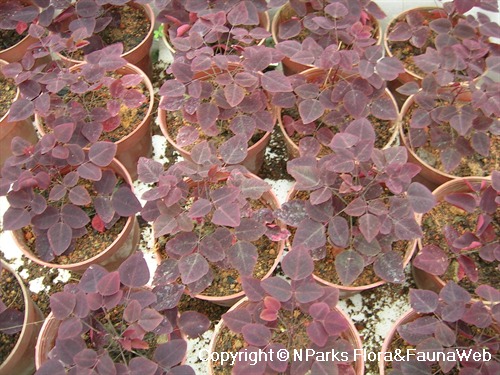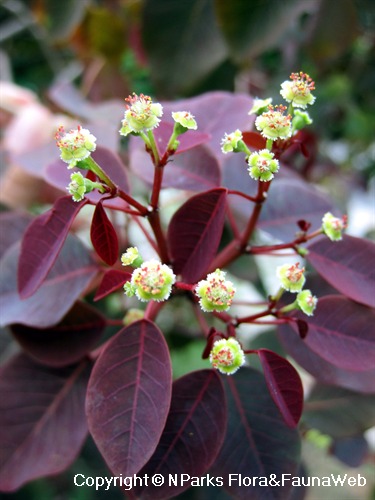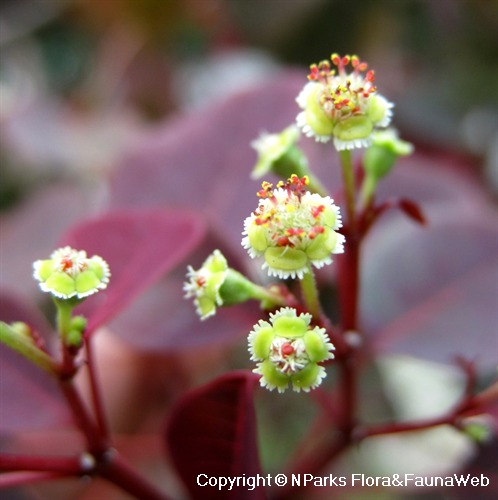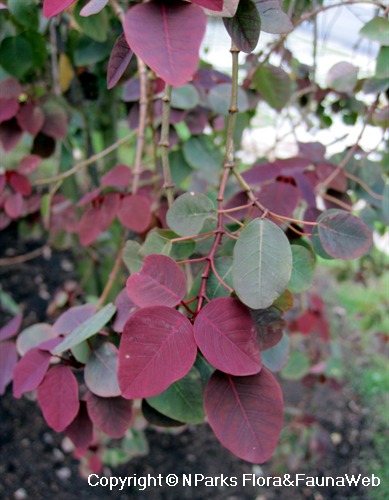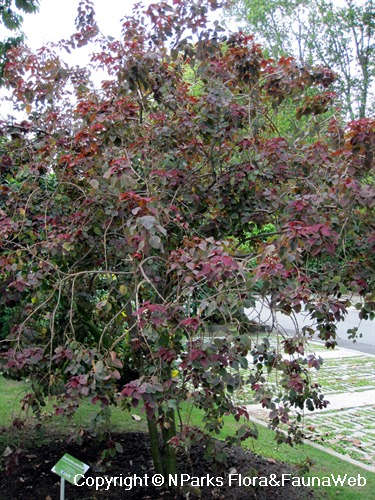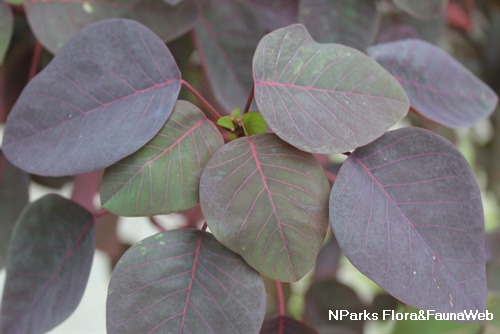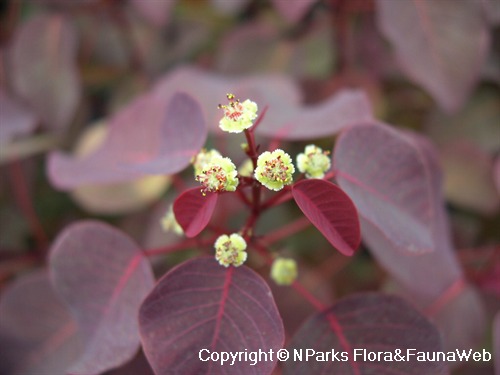
Back
Euphorbia cotinifolia
| Family Name: | Euphorbiaceae |
| Synonyms: | Acalypha cotinoides, Euphorbia scotana, Aklema cotinifolia, Acalypha scotanum, Acalypha cotinifolia, Acalypha caracassanum, Aklema scotana, Euphorbia cotinoides, Tithymalus cotinifolius |
| Common Name: | Caribbean Copper Plant, Red Spurge, Hierba mala, 紫锦木, 非洲红, 非洲黑美人, 俏黄栌 |
Name
Classifications and Characteristics
| Plant Division | Angiosperms (Flowering Seed Plants) (Dicotyledon) |
|---|---|
| Plant Growth Form | Shrub, Tree (Small (6m-15m)) |
| Lifespan (in Singapore) | Perennial |
| Mode of Nutrition | Autotrophic |
| Plant Shape | Rounded |
| Maximum Height | 6 m |
| Maximum Plant Spread / Crown Width | 2.4 m |
Biogeography
| Native Distribution | Mexico, Caribbean, South America |
|---|---|
| Preferred Climate Zone | Tropical |
Description and Ethnobotany
| Growth Form | An upright large shrub or small multi-stemmed tree, with stunning deep burgundy foliage. |
|---|---|
| Foliage | Leaves simple, pinnately-veined, bright red venation distinct, margin entire, leaf blade ovate-rounded, apex acute, base obtuse-rounded, 3-whorled, 4 to 6 cm long, 3 to 4 cm wide, deep burgundy (with young leaves having brighter tones of red); petiole 3 to 6 cm long; stipules up to 0.3 mm long. |
| Others - Plant Morphology | Stem: Stems glabrous, deep burgundy, multi-branched. Flower: Cyathia (inflorescences consisting of cuplike clusters of bracts enclosing unisexual flowers) numerous, peduncle up to 2 cm long; bracts broadly cup-shaped, highly inconspicuous, lobes 4 to 6, triangular, pilose on margin; male flowers numerous, bracts linear; female flowers protruding from enveloping bracts. Fruit: Fruit capsules 3-angular-ovoid, smooth, sparsely pubescent to glabrous, up to 4mm in diameter; Seeds subglobose, brown, up to 3mm in diameter, foveolate (having tiny depressions on the surface). |
| Cultivation | Performs best with adequate moisture and well-drained soils. While plant is quite drought tolerant, it sheds all of its leaves at the expense of this ability. Propagate by stem cuttings or division. Caution: Leaves can trigger an overall rash in ‘sensitive’ individuals upon physical contact. The sticky white sap any cut surface is highly irritating and can induce intense inflammation and blistering on skin contact, and at least temporary blindness in the eye. Wear appropriate equipment when handling the plant if need be. |
| Etymology | The genus epithet ‘Euphorbia’ is derived from 'Euphorbus', the Greek physician to Juba II, King of Mauretania. Juba II was treated by a plant (probably the Resin Spurge, Euphorbia resinifera) with powerful medicinal properties, of which he named after his Greek physician 'Euphorbus'. The species epithet ‘cotinifolia’ is in reference to its leaves, resembling like the ones of Cotinus (Smokebush). Many leafy species of Euphorbia are commonly called ‘spurges’, in this case red spurge, which means ‘purge’ or ‘cleanse’ from the Old French word espurgier (Latin expurgāre), with the tradition that the sap of many herbaceous 'Euphorbia' species have been used as a purgative or laxative. |
Landscaping Features
| Desirable Plant Features | Ornamental Foliage |
|---|---|
| Landscape Uses | Container Planting, General, Flowerbed / Border, Hedge / Screening, Focal Plant |
| Usage Hazard - Cons | Irritant - Sap, Toxic Upon Ingestion |
Plant Care and Propagation
| Light Preference | Semi-Shade |
|---|---|
| Water Preference | Moderate Water |
| Plant Growth Rate | Moderate |
| Rootzone Tolerance | Fertile Loamy Soils, Well-Drained Soils |
| Maintenance Requirements | Low |
| Propagation Method | Stem Cutting |
Foliar
| Foliage Retention | Evergreen |
|---|---|
| Mature Foliage Colour(s) | Red |
| Mature Foliage Texture(s) | Smooth |
| Foliar Type | Simple / Unifoliate |
| Foliar Arrangement Along Stem | Whorled |
| Foliar Shape(s) | Non-Palm Foliage (Obovate) |
| Foliar Venation | Pinnate / Net |
| Foliar Margin | Entire |
| Foliar Apex - Tip | Acute |
| Foliar Base | Rounded / Obtuse |
| Typical Foliar Area | Microphyll ( 2.25cm2 - 20.25 cm2 ) |
| Leaf Area Index (LAI) for Green Plot Ratio | 4.5 (Shrub & Groundcover - Dicot) |
Non - Foliar and Storage
| Trunk Type (Non Palm) | Woody |
|---|---|
| Stem Type & Modification | Woody |
Floral (Angiosperm)
| Flower & Plant Sexuality | Bisexual Flowers |
| Flower Colour(s) | Cream / Off-White, Yellow / Golden |
|---|---|
| Flowering Habit | Polycarpic |
Image Repository
Others
| Master ID | 706 |
|---|---|
| Species ID | 2001 |
| Flora Disclaimer | The information in this website has been compiled from reliable sources, such as reference works on medicinal plants. It is not a substitute for medical advice or treatment and NParks does not purport to provide any medical advice. Readers should always consult his/her physician before using or consuming a plant for medicinal purposes. |

